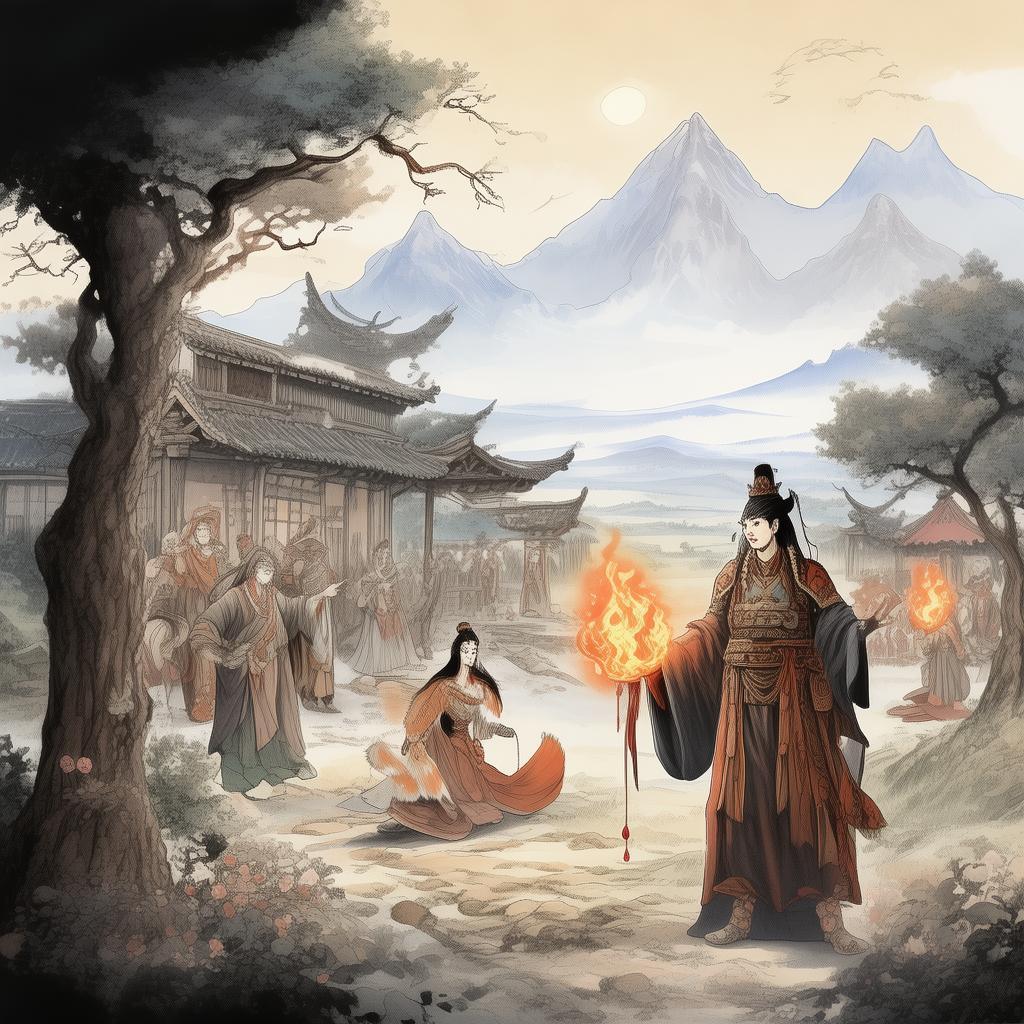The Whispering Strings of the Steppes
In the heart of the vast steppes, where the sky touches the earth, there lay a small, rustic village known to few. The villagers spoke of the steppes as a place of mystery and wonder, where the winds sang tales of old and the grasses whispered secrets long forgotten. Among them was a young man named Aria, whose life was a tapestry woven from the threads of music and tradition.
Aria was no ordinary musician. His fingers danced upon the strings of his lute with a grace that seemed to be guided by some unseen force. He could play any melody that came to his mind, but there was one song that eluded him. It was a song that his grandmother had spoken of in hushed tones, a song that was said to be the voice of the steppes themselves.
One evening, as the sun dipped below the horizon, casting long shadows across the steppes, Aria sat by the old, stone well in the village square. The well was the heart of the community, a place where stories were shared and secrets were kept. Aria's lute lay beside him, its strings silent, waiting for the song to emerge.
As he played a simple melody, the wind picked up, carrying with it the sound of distant horses and the rustling of grass. Aria's eyes closed, and he felt a presence near him. It was an old woman with a face etched with the lines of the steppes, her eyes twinkling with the wisdom of ages.
"I have heard your music, Aria," she said, her voice like the wind itself. "But there is a song that you have yet to play. It is the song of the steppes, the song that holds the soul of this land."
Aria's curiosity was piqued. "What is this song, grandmother?" he asked, his voice barely above a whisper.
The old woman reached into her bag and pulled out a small, worn-out scroll. "This is the melody," she said, handing it to Aria. "It is written in an ancient script, a language that has been forgotten. But the music speaks for itself."
Aria unrolled the scroll and began to read the script. His eyes widened as he realized that the symbols were not words, but musical notes. He placed the scroll on his lute and began to play. The melody was haunting, filled with the sounds of the steppes—of the horses running, the birds singing, and the wind howling through the grasses.
As he played, the village square seemed to change. The shadows grew longer, and the air grew colder. Aria felt as if he were being drawn into the heart of the steppes, into a world where time stood still.

Suddenly, the melody changed. It became faster, more intense. Aria played with all his might, his fingers flying over the strings. The wind howled louder, and the grasses swayed as if in a frenzy. Aria felt a presence beside him, the old woman's hand resting on his shoulder.
"The song has found you, Aria," she said. "Now, you must embrace your destiny."
Aria continued to play, the melody growing wilder, more powerful. The village square seemed to dissolve around him, and he was transported to a world he had never known. The steppes stretched out before him, endless and beautiful.
In this world, Aria discovered that he was not just a musician, but a guardian of the steppes. His destiny was to protect the land and its people, to keep the song alive, and to ensure that the soul of the steppes remained pure.
As the melody reached its climax, Aria felt a surge of energy course through him. He opened his eyes to find himself back in the village square, the old woman standing before him. The melody had ended, but the impact lingered.
"I have seen the future, Aria," the old woman said. "You will be the one to protect the steppes, to keep the soul of this land alive."
Aria nodded, understanding the weight of his new role. He looked down at his lute, the scroll still unrolled on its strings. The melody had changed him, given him a purpose he had never known.
From that day forward, Aria's music was no longer just for himself or the villagers. It was for the steppes, for the soul of the land. He played his lute every night, the melody of the steppes echoing through the village and into the darkness of the night.
And so, the song of the steppes lived on, a testament to the power of music and the enduring spirit of a people who called the vast steppes their home.
✨ Original Statement ✨
All articles published on this website (including but not limited to text, images, videos, and other content) are original or authorized for reposting and are protected by relevant laws. Without the explicit written permission of this website, no individual or organization may copy, modify, repost, or use the content for commercial purposes.
If you need to quote or cooperate, please contact this site for authorization. We reserve the right to pursue legal responsibility for any unauthorized use.
Hereby declared.









